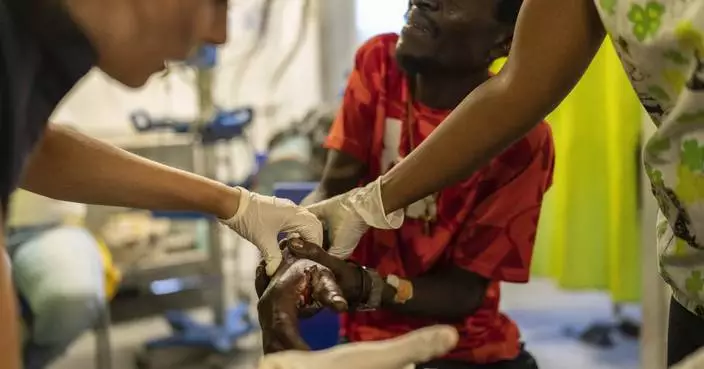As if giving birth to a child isn't bad enough; do woman have to give birth to pieces of cloth nowadays?!
This bizarre incident occurred in mainland China when, three days after a woman gave birth to her child via a caesarean section, three surgical gauzes were painfully discharged from within the mother's body. The Peking University People's Hospital from which the incident originated admitted on the 21st of August that the event was a medical error and that the doctor mistakenly left the gauzes in her body.
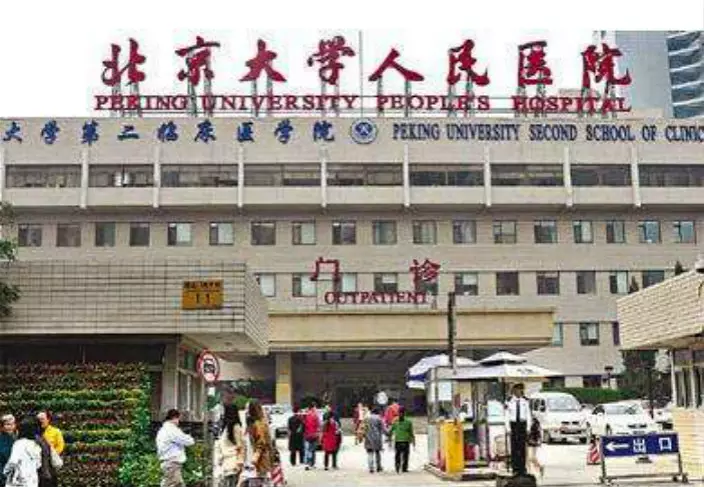
Online image
Mr Zhang, the husband of the then-pregnant woman indicated that his wife gave birth to a child at the Peking University People's Hospital on the 7th of August, during which a doctor used a hemostatic agent to stop bleeding. On the 8th, the doctor removed the haemostatic agent. After the woman was discharged from hospital on the 9th, she felt intense abdominal pain. At around 10:30 pm that night, she discharged three gauzes when on the toilet.
After the incident, Mr Zhang confronted the medical institute, which claimed that the doctor may have either forgot to remove the pieces of cloth, or may have intentionally left the gauze in the body to continually stop bleeding, but forgot to inform the family.
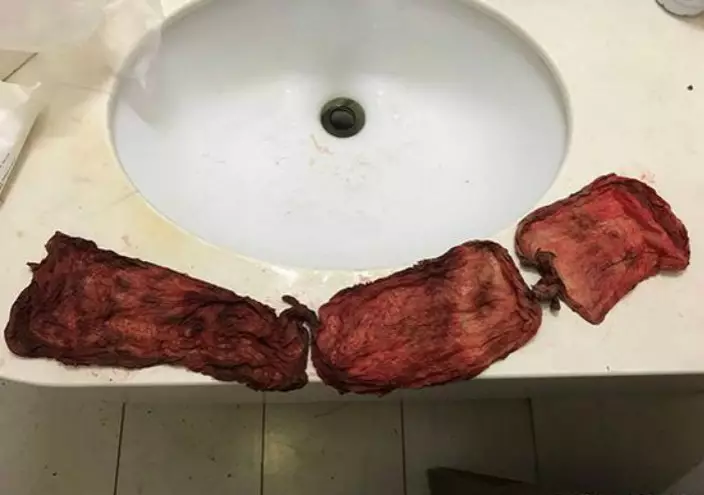
Online image
Mr Zhang pointed out that his priority wasn't monetary compensation by the hospital; he was simply hoping the medical staff could do a comprehensive inspection to ensure her wife would not face future complications and eliminate their concerns regarding her health.
However, the hospital maintained that they would have to submit a written application to request such service. Mr Zhang, dissatisfied with their attitude, takes the matters online, as he believes that the hospital should have taken initiative in communicating with patients to which they had caused damage to.
What puzzled Mr Zhang was that during his wife's hospitalisation, he was asked by the medical staff to go to shopping malls in the same building as the hospital to purchase a variety of things, such as haemostatic agents and other items that cannot be claimed with medical insurance, and range in cost from $10 to several thousand dollars.
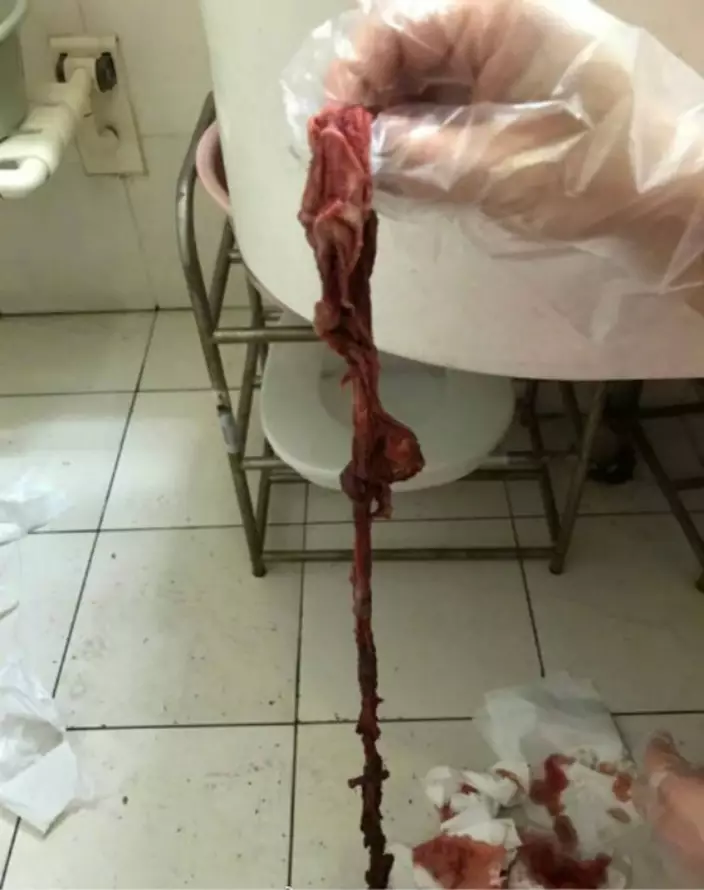
Online image
"[The hospital] did not explicitly say that you are forced to purchase [those items]", said Mr Zhang, "but the language and phrasing they use makes you feel like you can't not buy them."
The hospital released a statement on Friday the 17th, saying that according to normal procedures, the gauze should have been taken out after the haemostatic agent was removed, but this step was missed during Mr Zhang's wife's surgery.
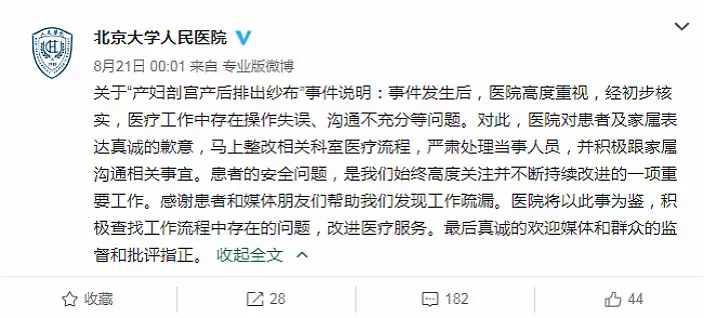
Online image
After the agent was removed, the gauze was not also taken out; as a result, it was discharged from the mother's vagia on the third day after the operation.
Hospital authorities also pointed out that according to regulations, the time for gauze being used as a filling and haemostasis generally does not go over 72 hours, and this incident did not exceed that time limit and adds that medical gauze that is stuck in the body will not cause future complications.
Later, on the 21st of August, the Peking University People's Hospital issued a statement on Weibo, acknowledging that there were operational errors in the medical procedure, inadequate communication and other issues, and said that the problems will be immediately rectified, and deal with the staff involved in said incident seriously. However, there was no mention or explanation of requiring Mr Zhang to purchase the 3600 RMB haemostatic agents in the hospital store.
CAPE TOWN, South Africa (AP) — Congo ’s government is questioning Apple about the tech company’s knowledge of “blood minerals” from a conflict zone in the African country that could be smuggled into its supply chains and is demanding answers within three weeks.
A group of international lawyers representing Congo said Thursday that they sent letters to Apple’s CEO Tim Cook and its French subsidiary this week, raising concerns about human rights violations involving the minerals extracted from mines in the country’s troubled east that might end up being used in the company’s products.
They included a list of questions challenging Apple to show how it monitors its supply chains in a region where more than 100 armed rebel groups operate, some of whom have been accused of carrying out mass killings of civilians.
Writing to Cook, the lawyers said “it has become clear to us that year after year, Apple has sold technology made with minerals sourced from a region whose population is being devastated by grave violations of human rights.”
"The iPhones, Mac computers and accessories that Apple sells to its customers around the world rely on supply chains that are too opaque, and that are tainted by the blood of the Congolese people," the lawyers said.
Eastern Congo is one of the most mineral-rich regions in the world but is also the site of a huge humanitarian disaster, with the armed groups fighting for years for control of the mines and the valuable minerals in them, and millions of people displaced and affected by the worsening violence. The situation has deteriorated badly in the last few months.
Apple’s press representatives in Europe didn’t respond to a request for comment.
Apple, which has a market value of around $2.6 trillion, has denied using minerals from mines and regions where human rights violations take place and says it conducts business ethically. It said in a 2023 report that it “responsibly” sources minerals in Congo and its neighboring countries.
The minerals it buys don't finance war or armed groups, it says. The lawyers for the Congo government said “those claims do not appear to be based on concrete, verifiable evidence.”
The Congo government said it has suspicions that some of the tin, tungsten, tantalum and gold — known as the 3TG critical minerals — that Apple sources from suppliers is smuggled out of Congo to neighboring Rwanda and then infiltrated into the global supply chain. The 3TG minerals are key components in electronics.
“In Congo, people have been dying for 30 years as a result of illegal mining,” Congo government spokesperson Patrick Muyaya said. “We want clarification on the sources of supply for major technology companies, in particular Apple, to verify whether they are acquiring minerals produced in completely illegal conditions.”
He said Rwanda “is presented” as the supplier for many of the minerals while having few reserves of its own.
Congo has accused Rwanda of financing and directing the notorious armed rebel group M23 in eastern Congo to help extract minerals illegally. The United Nations also says M23 is backed by Rwanda.
Rwanda denies that but tensions between the countries are increasingly high, while M23 and other groups are accused of regularly carrying out attacks that include the killing and raping of civilians, according to Human Rights Watch.
The lawyers for the Congo government quoted a 2022 report by the nongovernmental organization Global Witness that claimed Apple had previously applied “few meaningful mitigation measures” to avoid using smuggled minerals.
The Congo government was now seeking “effective redress” against “end-users of blood minerals” across the world, the lawyers said.
They asked Apple to respond to questions over its supply chain controls within three weeks and said they had compiled a report on “the laundering” of Congo's minerals by Rwanda and private entities that would be made public this month.
They also would seek instructions from the Congo government as to what legal measures it is considering against Apple, the letter said.
AP Business Writer Kelvin Chan in London and AP writer Saleh Mwanamilongo in Kinshasa, Congo, contributed to this report.
AP Africa news: https://apnews.com/hub/africa
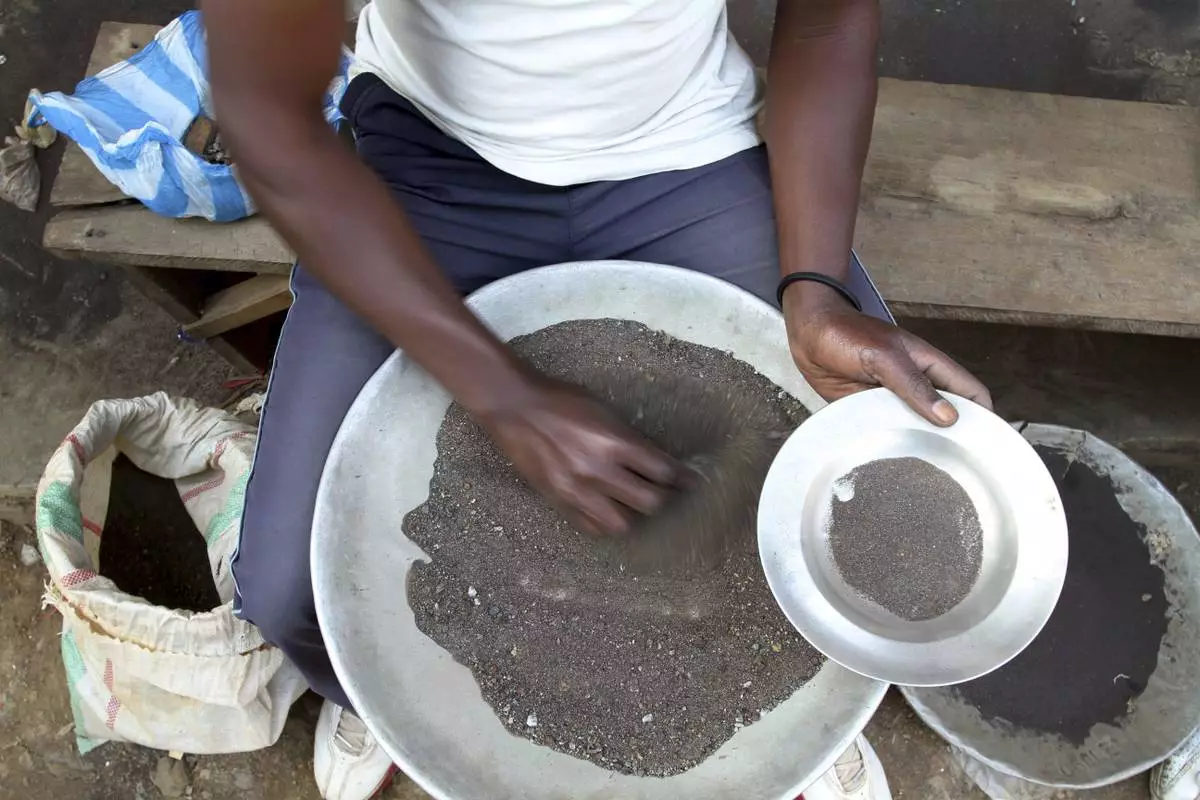
FILE - A Congolese miner sifts through ground rocks to separate out the cassiterite, the main ore that's processed into tin, in the town of Nyabibwe, eastern Congo, Aug. 16, 2012. Congo’s government is questioning Apple about the tech company’s knowledge of “blood minerals” from a conflict zone in the African country that could be smuggled into supply chains. A group of international lawyers representing Congo said Thursday, April 25, 2024, that it sent letters to Apple’s CEO Tim Cook and its French subsidiary this week raising concerns about human rights violations involving the minerals extracted from mines in the country’s war-torn east. (AP Photo/Marc Hofer, File)











